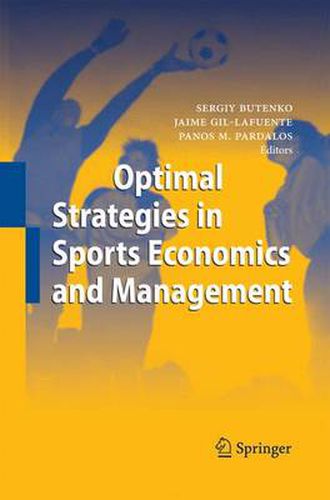Readings Newsletter
Become a Readings Member to make your shopping experience even easier.
Sign in or sign up for free!
You’re not far away from qualifying for FREE standard shipping within Australia
You’ve qualified for FREE standard shipping within Australia
The cart is loading…






This title is printed to order. This book may have been self-published. If so, we cannot guarantee the quality of the content. In the main most books will have gone through the editing process however some may not. We therefore suggest that you be aware of this before ordering this book. If in doubt check either the author or publisher’s details as we are unable to accept any returns unless they are faulty. Please contact us if you have any questions.
During the last century, we have witnessed the birth and evolution of sport as an economic activity, which has created jobs on the one hand, but also problems of management on the other. This process has not been immune from the parti- lar characteristics associated with sport, typically united here more than in other activities: technique, physical effort, entertainment and passion. And all this within a framework of ever-increasing consumption of ?nancial resources. It is not s- prising, therefore, that commonly-used economic models, based on mechanistic approaches, do not provide a viable solution to increasingly complex and incre- ingly frequent problems. Any attempt to apply such an approach in this technical, economic and ?nancial context can only result in failure. The high degree of subj- tivity inherent in sporting activity requires new tools, in which remodeled conc- tual, theoretical and technical elements should play an important role. Complexity, uncertainty and subjectivity are therefore basic to understand, and deal with, the phenomenon of sport. The necessity of resorting to these elements was identi?ed over a quarter of a century ago by a small group of professors and researchers at the University of Barcelona. Together we started the ?rst postgraduate courses and organized se- nars to alert sports centre managers, as well as to make private and public organi- tions aware of the increasing importance of a proper, speci?c management for sports organizations.
$9.00 standard shipping within Australia
FREE standard shipping within Australia for orders over $100.00
Express & International shipping calculated at checkout
This title is printed to order. This book may have been self-published. If so, we cannot guarantee the quality of the content. In the main most books will have gone through the editing process however some may not. We therefore suggest that you be aware of this before ordering this book. If in doubt check either the author or publisher’s details as we are unable to accept any returns unless they are faulty. Please contact us if you have any questions.
During the last century, we have witnessed the birth and evolution of sport as an economic activity, which has created jobs on the one hand, but also problems of management on the other. This process has not been immune from the parti- lar characteristics associated with sport, typically united here more than in other activities: technique, physical effort, entertainment and passion. And all this within a framework of ever-increasing consumption of ?nancial resources. It is not s- prising, therefore, that commonly-used economic models, based on mechanistic approaches, do not provide a viable solution to increasingly complex and incre- ingly frequent problems. Any attempt to apply such an approach in this technical, economic and ?nancial context can only result in failure. The high degree of subj- tivity inherent in sporting activity requires new tools, in which remodeled conc- tual, theoretical and technical elements should play an important role. Complexity, uncertainty and subjectivity are therefore basic to understand, and deal with, the phenomenon of sport. The necessity of resorting to these elements was identi?ed over a quarter of a century ago by a small group of professors and researchers at the University of Barcelona. Together we started the ?rst postgraduate courses and organized se- nars to alert sports centre managers, as well as to make private and public organi- tions aware of the increasing importance of a proper, speci?c management for sports organizations.